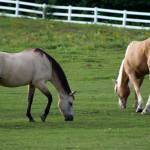Grazing Benefits Both Horses and Pastures

Minimizing the amount of time spent confined to a stall and maximizing time grazing on pasture benefits horses in three important ways:
- Free movement in pasture helps keep arthritic joints lubricated, minimizing swelling and pain;
- Respiratory issues such as asthma, especially heaves, can be improved; and
- Maintaining normal brain function through stimulation and social interaction.
Not only does the horse reap the rewards of grazing much of the day but, according to some scientists, the pastures are also healthier when grazed rather than mowed.
The positive impact of continuous grazing for both horse and pasture was recently described in a study published by Swedish researchers. Twelve stallions were maintained on pasture for three consecutive years without supplementary feed.
Pasture quality was monitored over the three years by evaluating chemical composition of energy, protein, and fiber content of the forage and comparing it to areas that were mowed instead of grazed. Key findings included:
- Metabolizable energy and crude protein content were higher in areas that were grazed over the study period compared to other areas sampled;
- Fecal samples reflected the quality of the pasture, suggesting that fecal analysis of nutrients can provide a rough estimate of the quality of pasture consumed by horses;
- In this study, crude protein content was sufficient to meet protein requirements of adult horses year-round, but energy (caloric) content and pasture availability was limited in winter.
“In summary, this study showed that continuous grazing altered pasture nutrient composition to a greater extent than mowing. Forages that were actively grazed during sampling had higher nutritive value,” said Catherine Whitehouse, M.S., a Kentucky Equine Research nutrition advisor.
“This study was conducted in Sweden and therefore may not translate fully to horses in North America or other areas of the world,” she added. “The horses in the study incurred significant weight loss in the winter. Horses residing in northern climates will require additional feed in the winter but would still benefit from being turned out a good portion of the day.”
To learn more about maintaining horses on pasture and how to supplement wintertime diets, contact a Kentucky Equine Research nutrition advisor. Be sure to ask about forage analysis to ensure all nutrients are being provided and pasture quality meets your horse’s specific dietary needs. This is especially true for horses with endocrinopathies such as equine metabolic syndrome and insulin dysregulation.
“Based on forage analysis, some horses may require a vitamin and mineral supplement that is appropriate for horses on pasture,” Whitehouse advised.
*Ringmark, S., A. Skarin, and A. Jansson. 2019. Impact of year-round grazing by horses on pasture nutrient dynamics and the correlation with pasture nutrient content and fecal nutrient composition. Animals (Basel). 9(8). pii: E500.








